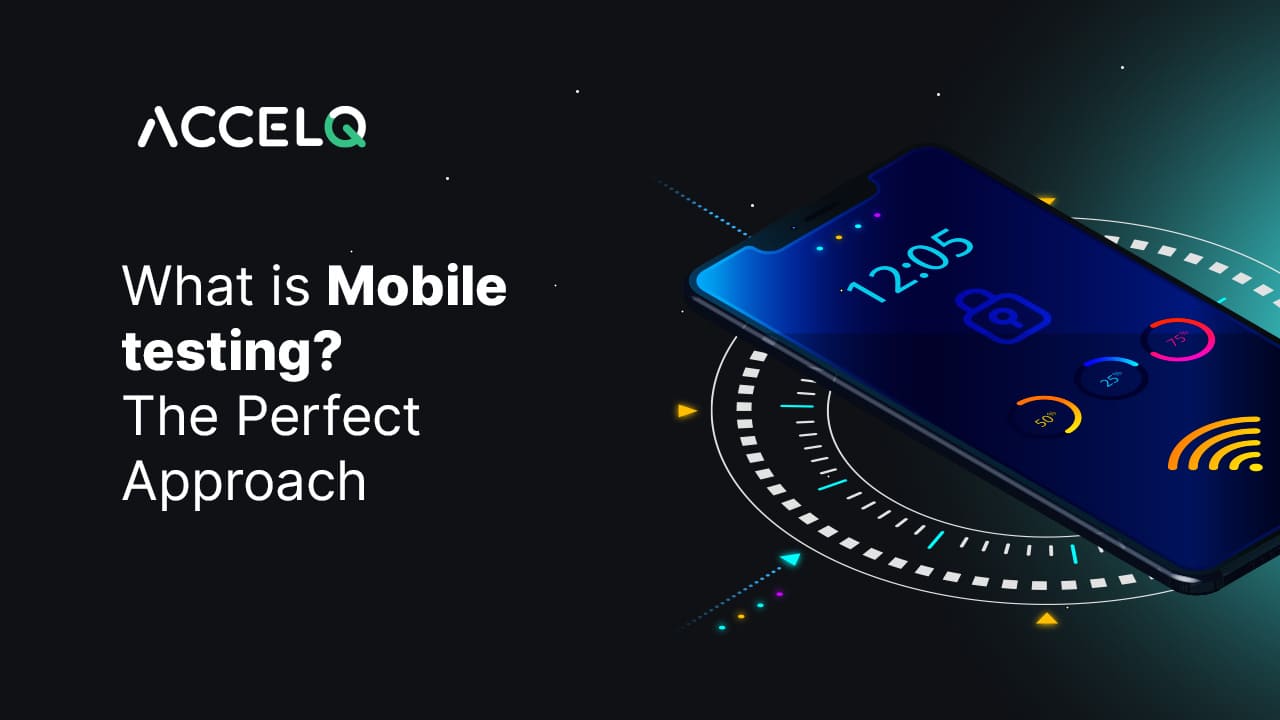Mobile Testing: A Complete Guide to Strategy & Frameworks

With the world driven by smartphones, mobile apps have undoubtedly become the backbone of customer service. Whether they are shopping, banking, socializing, or streaming — users expect apps to be fast, functional, and flawless. But how can businesses make sure their apps fulfill those expectations over thousands of devices, networks, and operating systems? That’s where mobile testing comes into play.
- What is Mobile Testing?
- Why Mobile Testing is Essential?
- Types of Mobile Testing
- Challenges in Mobile Testing
- Manual vs Automated Mobile Testing
- Crafting a Mobile Testing Plan
- Mobile Testing Frameworks to Explore
- Examples of Mobile Testing in Real-World Scenarios
- Why Choose ACCELQ for Mobile Test Automation?
- Conclusion
What is Mobile Testing?
Mobile testing is an important part of making applications function uniformly and safely in a user-friendly manner across all mobile platforms. From identifying UI glitches to testing for consistent performance in low-network areas, a solid software mobile testing strategy is a must for delivering high-quality digital experiences.
Why Mobile Testing is Essential?
In fact, there are over 6.6 billion smartphone users worldwide, and mobile apps serve as a key driver of business growth and user engagement. Whether in banking, e-commerce, healthcare, or entertainment, apps need to be tested end-to-end to make sure they are meeting the user expectations of speed, responsiveness, and stability.
Key Benefits:
- Increased user retention and satisfaction
- Reduced app crashes and negative reviews
- Improved device and OS compatibility
- Optimized performance under varying network conditions
Types of Mobile Testing
However, there is no one-size-fits-all approach to a mobile automation testing framework. Another type of testing is about ensuring the smooth operation of each element of the app, from its UI to backend logic.
Functional testing ensures all user interactions (login, transactions, notifications, etc.) perform correctly and the app behaves as expected.
Performance testing checks how the app handles heavy usage, varying bandwidths, and battery/memory consumption.
Usability testing assesses the app’s intuitiveness, ease of navigation, and overall user experience across real devices.
Compatibility testing validates the app’s functionality on various OS versions, screen sizes, devices, and resolutions.
Security testing identifies vulnerabilities and ensures data protection, especially for apps handling sensitive information.
Interrupt testing simulates real-world interruptions, such as incoming calls, messages, and low battery notifications, and assesses how the app recovers.
Challenges in Mobile Testing
Testing mobile applications comes with its own set of challenges:
- Device Fragmentation: Thousands of devices with different screen sizes, OS versions, and hardware.
- Network Variability: Ensuring app performance on 3G, 4G, 5G, and Wi-Fi.
- Frequent OS Updates: Rapid update cycles demand quick testing adaptability.
- Security Concerns: Data privacy and safe transactions are paramount.
- Third-Party Integrations: Apps with multiple APIs or SDKs require end-to-end testing.
Manual vs Automated Mobile Testing
| Feature | Manual Testing | Automated Testing |
|---|---|---|
| Best For | Usability & exploratory testing | Regression & performance testing |
| Efficiency | Time-consuming | Fast and scalable |
| Accuracy | Prone to human error | High accuracy |
| Cost | Low initial, high long-term | High initial, cost-efficient long-term |
| Flexibility | Easily adaptable | Needs script maintenance |
| Test Coverage | Limited | Broad and repeatable |
For large-scale applications with continuous updates, an automated mobile testing framework ensures faster releases and better coverage.
Crafting a Mobile Testing Plan
Here’s how to structure a robust mobile automation testing strategy:
- Define Testing Scope: Identify the app type—native, hybrid, or web—and outline test objectives based on business goals.
- Select Target Devices: Focus on the most popular devices used by your audience. Consider using a mobile device cloud for wider reach.
- Choose Testing Types: Different types of testing, like functional, performance, security, and usability testing, are based on the app’s critical user journeys.
- Automate Smartly: Use automated frameworks for repetitive and regression tasks, while retaining manual tests for UX and exploratory checks.
- Evaluate Tools: Select mobile automation testing tools that support cross-platform testing, real device interaction, and CI/CD pipelines.
Mobile Testing Frameworks to Explore
Appium
Appium is an open-source, cross-platform framework that is used for automating native and hybrid apps on both Android and iOS across multiple platforms.
Selendroid
An Android testing framework based on Selenium, which can also be integrated into your existing Selenium grids.
Robot Framework
An open-source, keyword-driven tool that supports mobile and web app testing across OS platforms and integrates with Python and Java.
Examples of Mobile Testing in Real-World Scenarios
- Banking Apps: Testing multi-factor authentication, secure logins, and transaction flows.
- E-commerce Apps: Validating shopping cart flows, payment gateways, and push notifications.
- Healthcare Apps: Follow HIPAA compliance, scheduling appointments, and data receiving.
- Ride-Sharing Apps: Verifying the accuracy of GPS, fare calculations, and real-time tracking.
Why Choose ACCELQ for Mobile Test Automation?
The amalgamation of intelligent automation and scalable AI-based testing tools is the foundation for future-ready financial actions.
- Codeless interface for faster adoption and quicker test authoring
- Cross-platform support for Android, iOS, and hybrid apps
- AI-driven test generation for end-to-end test coverage
- CI/CD integration for continuous mobile test automation
- Cloud device access for testing on real devices without infrastructure investment
Ready to elevate your mobile testing game? Start your 14-day free trial with ACCELQ.
Final Thoughts
In today’s hyper-mobile environment, businesses can’t afford to release their apps with bugs or slow load times. An effective mobile testing strategy—along with the right automation tools—guarantees that your apps are fast, secure, and user-centric.
If you are new to mobile testing frameworks or scaling automation for enterprise apps, ensure that your strategy is designed to test smarter — not harder.
Suggested Watch:
Prashanth Punnam
Sr. Technical Content Writer
With over 8 years of experience transforming complex technical concepts into engaging and accessible content. Skilled in creating high-impact articles, user manuals, whitepapers, and case studies, he builds brand authority and captivates diverse audiences while ensuring technical accuracy and clarity.
You Might Also Like:
 15 Best Mobile Testing Tools
15 Best Mobile Testing Tools
15 Best Mobile Testing Tools
 Mastering Mobile Testing For Better Outcomes
Mastering Mobile Testing For Better Outcomes
Mastering Mobile Testing For Better Outcomes
 How To Choose the Best Mobile Automation Tool
How To Choose the Best Mobile Automation Tool
































